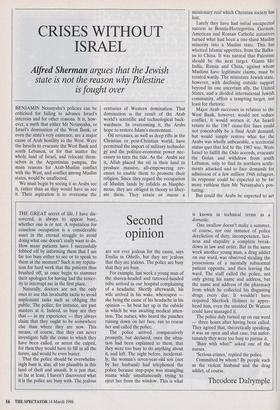Second opinion
THE GREAT secret of life, I have dis- covered, is always to appear busy, whether one is or not. A reputation for ceaseless occupation is a considerable asset in the eternal struggle to avoid doing what one doesn't really want to do. How many patients have I successfully fobbed off by informing them that I am far too busy either to see or to speak to them at the moment? Such is my reputa- tion for hard work that the patients thus brushed off, at once begin to stammer their apologies for having had the temer- ity to interrupt me in the first place.
Naturally, doctors are not the only ones to use this invaluable tactic to avoid unpleasant tasks such as obliging the public. The police, for instance, are past masters at it. Indeed, so busy are they that — in my experience — they always claim that they ought to be somewhere else than where they are now. This means, of course, that they can never investigate fully the crime to which they have been called, or arrest the culprit, for then they would have to fill in all the forms, and would be even busier.
That the police should be overwhelm- ingly busy is, alas, all too plausible in this land of theft and assault. It is just that, so far at least, I haven't discovered what it is the police are busy with. The jealous are not ever jealous for the cause, says Emilia in Othello, but they are jealous that they are jealous. The police are busy that they are busy.
For example, last week a young man of the shaven-headed and tattooed-handed tribe arrived in our hospital complaining of a headache. Shortly afterwards, his wife arrived in his wake, whereupon she being the cause of his headache in his opinion — he beat her up in the cubicle in which he was awaiting medical atten- tion. The nurses, who heard the punches raining down on her face, ran to rescue her and called the police.
The police arrived comparatively promptly, but declared, once the situa- tion had been explained to them, that they were too busy to do anything about it, and left. The night before, incidental- ly, the woman's seven-year-old son (not by her husband) had telephoned the police because step-papa was strangling mama while simultaneously trying to eject her from the window. This is what is known in technical terms as a domestic.
One swallow doesn't make a summer, of course, nor one instance of police dereliction of duty, incompetence, lazi- ness and stupidity a complete break- down in law and order. But in the same week another young man, a drug addict on our ward, was observed stealing the possessions of a mentally subnormal patient opposite, and then leaving the ward. The staff called the police, not only giving his name and address, but the name and address of the pharmacy from which he collected his disgusting drugs every day. It wouldn't have required Sherlock Holmes to appre- hend him, even the unaided Dr Watson could have managed it.
The police duly turned up on our ward — three hours after having been called. They agreed that, theoretically speaking, it was an open and shut case, but unfor- tunately they were too busy to pursue it.
`Busy with what?' asked one of the nurses.
`Serious crimes,' replied the police.
Committed by whom? By people such as the violent husband and the drug addict, of course.
Theodore Dalrymple


































































 Previous page
Previous page